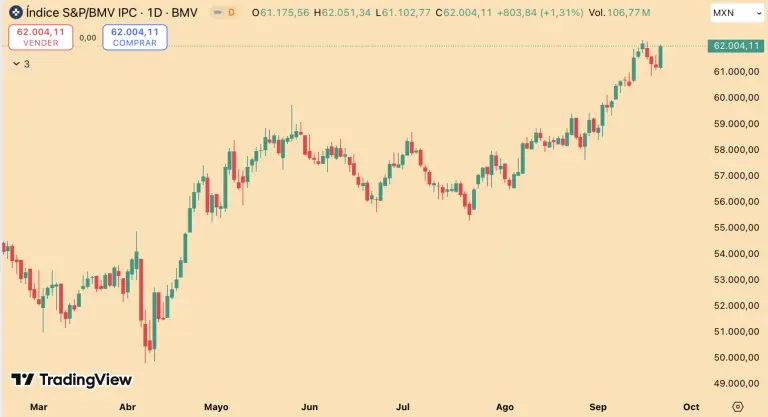Background on Key Players and Relevance
The Mexican stock market, represented by the S&P/BMV IPC and FTSE BIVA indices, experienced a significant rebound at the start of this week. After three consecutive days of losses, local indices advanced, nearing record-breaking levels, with Peñoles shares leading the surge.
Peñoles, a prominent mining company, is a significant player in Mexico’s industrial sector. As one of the country’s largest producers of precious metals, including gold and silver, Peñoles plays a crucial role in Mexico’s economy. Its performance directly impacts investors and the broader market, making it a key indicator of Mexico’s industrial health.
Market Performance and Key Contributors
The S&P/BMV IPC, the primary index of the Bolsa Mexicana de Valores (BMV), rose by 1.31% to 62,004.11 points. The FTSE BIVA index, managed by the Bolsa Institucional de Valores (Biva), increased by 1.11% to 1,241.31 points.

S&P/BMV IPC
Within the benchmark index, most values closed with gains. Peñoles stood out with a 5.94% increase to 781.64 pesos, followed by Megacable (4.59% to 62.46 pesos) and Grupo México (2.80% to 137.09 pesos).
Market Outlook and Upcoming Events
This week, the Mexican market will be influenced by the Banxico’s interest rate announcement. Market operators widely anticipate a 25-basis-point reduction in the benchmark interest rate, amidst a sluggish economic performance and controlled inflation.
Key Questions and Answers
- What is the Mexican stock market’s performance this week? The Mexican stock market kicked off the week with a 1.31% gain, bringing the S&P/BMV IPC to 62,004.11 points and the FTSE BIVA to 1,241.31 points.
- Who is Peñoles, and why is its performance significant? Peñoles is a leading mining company in Mexico, producing precious metals like gold and silver. Its strong performance indicates a healthy industrial sector in Mexico, impacting investors and the broader market.
- What factors will influence the Mexican stock market this week? The Banxico’s interest rate announcement will play a crucial role, with market operators expecting a 25-basis-point reduction due to weak economic performance and controlled inflation.






